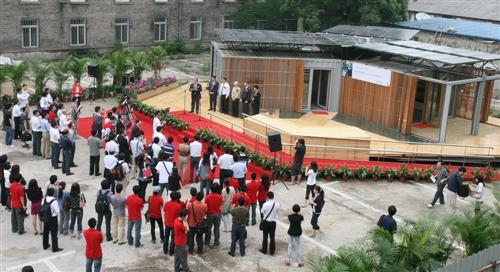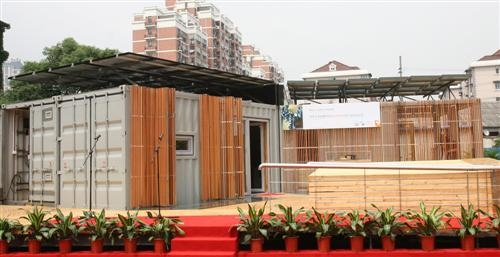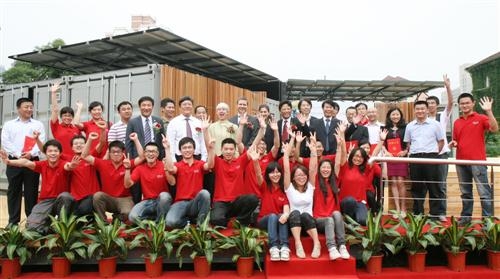Six containers are assembled into a succinct Y-shaped space equipped with appliances with renewable energy systems. On June 16, a “solar house”, on the design and construction of which a multi-disciplinary team from Tongji university has spent more than a year and a month respectively,made its first appearance in Zhangwu Campus of Tongji University. In a few weeks, it will be dismounted and transported to America, for the Solar Decathlon 2011 in Washington, DC, America which will stage at the end of September. Tongji University is the only contestant from Asia that will participate in this event.

Completion and shipment ceremony of the “Solar house” was held in the afternoon of June 16. Present at the ceremony were, among others, US Consul General in Shanghai Beatrice Camp, Cultural Affairs Officer Mr. Pfleger, Prof. Zhou Jialun, Chairman of the University Council, executive vice president Li Yongsheng, vice presidents Chen Xiaolong and Dong Qi of Tongji University, faculty program adviser Tan Hongwei, Qian Feng, the representative of Green Alliance of Chinese Universities established that day in the morning, and the representative of the sponsors.
Prof. Zhou Jialun, Chairman of the University Council, said in his speech that Tongji University spent two consecutive years preparing for the Solar Decathlon, with the purpose of enhancing the multi-disciplinary and hands-on capability, and promoting “Excellent Engineers' Training”. It is a new move in constructing a sustainable campus.
The Solar Decathlon initiated and sponsored by the U.S. Department of Energy, is held every two years and challenges 20 colleges to design, build, and operate solar-powered houses with appliances with renewable energy systems that are available today.

In March 2010, the project “solar house” from the team of Tongji University was selected by the organizing committee to participate in the Solar Decathlon. The team is composed of more than 30 students of different professional learning such as architecture, HAVC, structural, Electronics and Information Engineering. The team has kept improving and optimizing the program. The construction of the “solar house” was started on May 10 this year completed on June 15 on schedule.
The “solar house” of Tongji University covers a building area of 90 square meters. It is assembled by 6 shipping containers, with 2 containers combined in a set and a 120-degree landscape view. It is easy to transport, assemble and expand, as standard shipping and living modules enable residents to build anywhere and in any configuration. According to the leader of the project Prof. Tan Hongwei, Deputy Director of Green Building and New Energy Research Center, this model can be made of waste containers. It features fast transportation and construction, and can be used as post-disaster housing for temporary shelters and for many other purposes.

The energy system in the “solar house” was made flexible and efficient with technologies: the photovoltaic system installed on the roof is optimized; high-performance new Vacuum insulation panels are installed in the wall, ceiling and floor; the HVAC system with heat recovery and solar thermal collector system improves the overall efficiency of solar energy; light pipe introduces natural light for interior lighting, and rainwater and water reuse systems maximize the use of natural resources. In addition, indoor environmental monitoring, energy and equipment management have all achieved digitalization, informatization and visualization. One can gain a real-time visual display of the capacity, energy consumption and living environment of the house, and can use 3G mobile phones and other mobile terminals for remote control.
The student leader of the project, a second grade architecture graduate said: “involved in the project of solar house, I’ve got the opportunity to experience the entire process of constructing a building, from drawing to actual construction, until the successful completion before my graduation. I’ve learned a lot. It’s been a great experience.”
The Solar Decathlon 2011 will open in Washington, DC, September 23. The team will assemble the solar house in one week before the competition in the specified field. After that, they will show how people live normal lives in the house and accept evaluation by experts and the public.
Judges will evaluate the competitors on the basis of 10 indexes: house design, engineering and construction, solar system, electric energy balance, market appeal, technological innovations and sustainability. The Solar Decathlon delivers student participants and the public many cost-saving clean-energy products; demonstrates to the public cost-effective houses that combine energy-efficient construction with appliances with renewable energy systems that are available today; and provides participating students with unique training that prepares them for jobs.
During the ceremony, the leaders presented certificates of donation to several corporation sponsors. Clean-energy corporation ENN Group has provided sponsorship for two consecutive years.
It is the second time that Tongji university has participated in the Solar Decathlon. In June last year, Tongji’s Bamboo House went to Madrid, Spain for the Solar Decathlon Europe, receiving wide attention and great honor. In April this year, the University, along with other universities, was awarded the “Sustainable Energy Europe Award” by the European Commission.
The Solar Decathlon 2013 will stage in China.